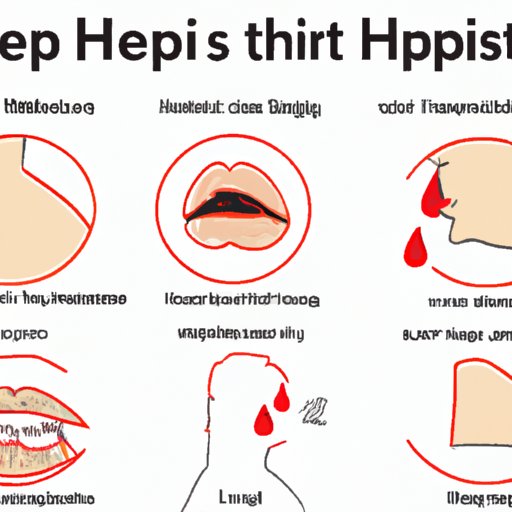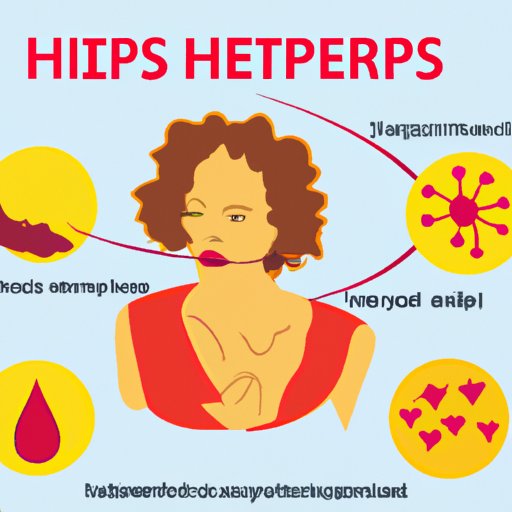Introduction
Herpes is a virus that affects millions of people around the world. It can cause painful sores on the skin, as well as other symptoms such as fever, fatigue, and swollen lymph nodes. In this article, we will explore how herpes works and what you need to know about it.

Symptoms of Herpes and How It is Caused
The most common symptom of herpes is small, painful blisters or sores on the skin. These sores can appear around the mouth, genitals, or other areas of the body. Other symptoms of herpes may include fever, fatigue, and swollen lymph nodes.
Herpes is caused by a virus called the herpes simplex virus (HSV). There are two types of HSV: type 1 and type 2. Type 1 is usually responsible for oral herpes, while type 2 is typically responsible for genital herpes. Both types of the virus can be spread through direct contact with an infected person’s skin.
Transmission of Herpes from Person to Person
The virus can be transmitted from one person to another through direct contact with an infected person’s skin. This includes contact with saliva, semen, vaginal secretions, or skin-to-skin contact. The virus can also be transmitted through sharing objects such as towels, razors, and sex toys. It is important to note that the virus can be spread even if there are no visible signs or symptoms present.
It is also possible to contract herpes through sexual activity. An infected person can pass the virus to their partner through unprotected oral, anal, and/or vaginal sex. It is important to use protection such as condoms or dental dams to reduce the risk of transmission.

Different Types of Herpes and Their Effects
There are two main types of herpes: oral herpes (type 1) and genital herpes (type 2). Oral herpes typically causes cold sores or fever blisters around or inside the mouth. Genital herpes usually causes sores or blisters around the genitals or rectum. Both types of the virus can cause similar symptoms, including itching, burning, and pain in the affected area.
The symptoms of herpes can vary from person to person. Some people may experience mild symptoms, while others may experience more severe symptoms. The virus can also have a greater impact on people with weakened immune systems, such as those with HIV or AIDS.
Treatment of Herpes
While there is no cure for herpes, there are treatments available to help reduce symptoms and shorten the duration of outbreaks. Antiviral medications such as acyclovir and valacyclovir are commonly prescribed to treat herpes. These medications can help to reduce the severity and duration of symptoms. Additionally, topical creams and ointments can be used to relieve pain and itching associated with herpes.
In some cases, home remedies such as warm baths and cold compresses can help to reduce symptoms. It is important to speak with your doctor before trying any home remedies, as some may not be effective or safe.
Long-term Impact of Herpes
Although herpes is generally not life-threatening, it can have a long-term impact on a person’s health and quality of life. People with herpes may experience social stigma and discrimination, as well as feelings of guilt, shame, and depression. Additionally, recurrent outbreaks can lead to chronic pain and fatigue, which can have a negative effect on daily life.
In some cases, herpes can also increase the risk of certain health problems, such as meningitis, encephalitis, and pelvic inflammatory disease. People with weakened immune systems are at an increased risk of developing more severe complications.

Current Research into Better Treatments for Herpes
Researchers are currently exploring new treatments for herpes. One potential treatment is gene therapy, which involves introducing genetic material into cells to alter their behavior. This could potentially be used to create a “vaccine” to treat or even prevent herpes. Another potential treatment is the use of monoclonal antibodies, which are designed to target specific proteins on the surface of the virus.
These treatments are still in the early stages of development and may take several years before they are available to the public. It is important to speak with your doctor about the best treatment options for you.
Ways to Prevent Contracting Herpes
The best way to prevent contracting herpes is to practice safe sex. This includes using condoms or dental dams when engaging in sexual activities. Additionally, it is important to avoid contact with someone who has active sores, as this can increase the risk of transmission.
It is also important to practice good hygiene. This includes washing hands regularly, avoiding sharing items such as towels and razors, and avoiding touching the eyes, nose, or mouth after touching an affected area. Finally, it is important to get tested regularly to ensure early detection and treatment of the virus.
Conclusion
Herpes is a virus that affects millions of people worldwide. It can cause painful sores on the skin, as well as other symptoms such as fever, fatigue, and swollen lymph nodes. The virus is spread through direct contact with an infected person’s skin, as well as through sexual activity. While there is no cure for herpes, there are treatments available to help reduce symptoms and shorten the duration of outbreaks. Additionally, practicing safe sex and good hygiene can help to reduce the risk of contracting herpes.
(Note: Is this article not meeting your expectations? Do you have knowledge or insights to share? Unlock new opportunities and expand your reach by joining our authors team. Click Registration to join us and share your expertise with our readers.)
